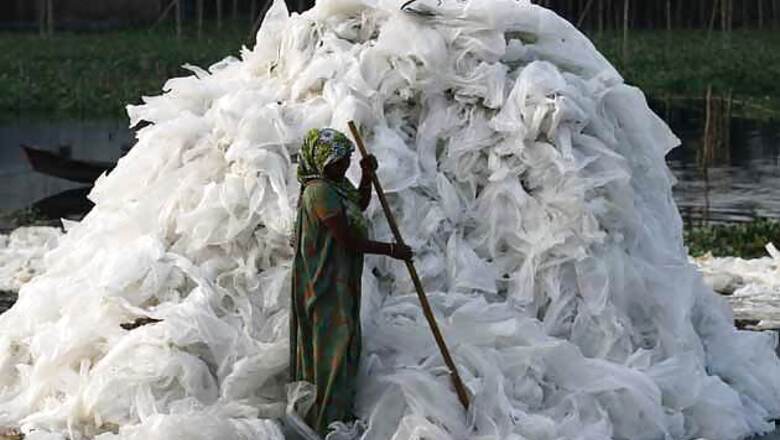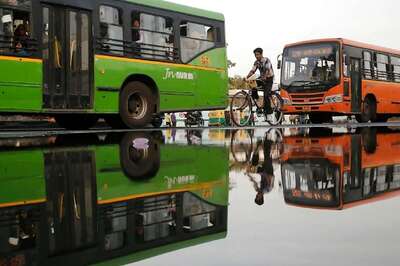
views
Himachal Pradesh is the first state in the country to ban polythene-packed edible items in compliance with the order of the state High Court which has completely prohibited use of polythene packaging for non-essential food items. Will the rest of the country follow its example? Bharati Chaturvedi, founder and director of Chintan Environmental Research and Action Group, joined IBNLive readers for an interaction on the issue.
Q. Are you sure that no appeal and request for stay has been filed on the orders of High Court? The bag manufacturers might sight loss of business for them. Asked by: sundar1950in
A. Manufactures have filed for stay in the High Court, and got it. You are right.
Q. Are there any viable alternatives instead of polythene packs which can be used for large scale packing and distribution? Asked by: Rajeev
A. In many countries, they have shifted to cloth, jute and also cartons.They seal some products in plastic woven bags which are reused. In Germany, exporters have to either send items in jute and other prescribed materials or pay for the disposal of the plastic they use. Even in India, a lot of things don't get packed in plastic for large scale. But we do need to stop using polystyrene (bubble wrap) as it is toxic and cannot be recycled.
Q. The number of Polythene and plastic bags at retail shops and malls is growing unchecked. Is the ministry of Environment in no position to act on eliminating/minimising the usage? Asked by: sundar1950in
A. The Ministry has made the Plastic Waste (Handling and Management) Rules. 2011. Here is a summary. The Plastic Waste Rules apply to plastic carry bags and multi-layered plastic pouches or sachets. Carry bags are defined as "bags made from any plastic material used for the purpose of carrying or dispensing commodities but do not include bags that constitute or form an integral part of the packaging in which goods are sealed prior to use." Multilayered plastic pouch or sachet is defined as a "pouch or sachet having at least one layer of plastic in combination with one or more layers of packaging material such as paper, paper board, metalised layers or aluminum foil, either in the form of a laminate or co-extruded structure." (Example : Packaging of Uncle Chips, Kurkure, Tetrapak etc.) Key rules related to plastic carry bags and multi-layered plastic pouches and sachets are: •Carry bags shall either be in natural shade (colourless) which is without any added pigments or made using only those pigments and colourants which are in conformity with Indian standard: IS : 9833: 1981 titled as List of pigments and colourants for use in plastics in contact with foodstuffs, pharmaceuticals and drinking water, as amended from time to time. •No person shall use carry bags made of recycled plastics or compostable plastics for storing, carrying, dispensing or packaging food stuffs; •No person shall manufacture, stock, distribute or sell any carry bag made of virgin or recycled or compostable plastic, which is less than 40 microns in thickness. •Sachets using plastic material shall not be used for storing, packing or selling gutkha, tobacco and pan masala; •Recycled carry bags shall conform to the Indian standard IS 14534:1998 titled as Guidelines for Recycling of Plastic, as amended from time to time; •Carry bags made from compostable plastics shall conform to the Indian Standard :IS/ISO 17088:2008 titled as specifications for Compostable plastics, as amended from time to time; •Plastic material, in any form, shall not be used in any package for packing gutkha, pan masala and tobacco in all forms. The following responsibilities are assigned to three groups of stakeholders-municipal authority, state pollution control board, and manufacturers/recyclers of plastic carry bags and multi-layered plastic pouches or sachets-in the implementation of the Rules: Municipal authority is the prescribed authority for enforcement of the provisions of these rules relating to the use, collection, segregation, transportation and disposal of the plastic waste. The municipal authority shall be responsible for: 1. Setting up, operationalisation and co-ordination of the waste management system and for performing the associated function, namely: a.to ensure safe collection , storage, segregation, transportation, processing and disposal of plastic waste; b.to ensure that no damage is caused to the environment during this process; c. to ensure setting up of collection centres for plastic waste involving manufactures; d.to ensure its channelization to recycles; e.to create awareness among all stakeholders about their responsibilities; f. to engage agencies or groups working in waste management including waste pickers, and g. to ensure that open burning of plastic waste is not permitted; 2. Setting up collection systems for plastic waste shall be of the municipal authority concerned and the said municipal authority may, for this purpose, seek the assistance of manufacturers of plastic carry bags, multilayered plastic pouches or sachets or of brand owners using such products; working out the modalities of a mechanism based on Extended Producer's Responsibility involving such manufacturers, registered within it's jurisdiction and brand owners with registered offices within it's jurisdiction either individually or collectively, as feasible or setup such collection systems through its own agencies; [Extended Producer Responsibility means the responsibility of a manufacturer of plastic carry bags, and multi‐layered plastic pouches and sachets and the brand owners using such carry bags and multi‐layered plastic pouches and sachets for the environmentally sound management of the product until the end of its life.]; 3. Incorporating the said rules in municipal bye-laws; 4. Municipality shall "engage agencies or groups working in waste management including waste pickers." State Pollution Control Boards are the prescribed authority for enforcement of the provisions of these rules related to registration, manufacturer and recycling. The SPCB shall be responsible for: 1. Registering and renewing the registrations of manufacturers of plastic carry bags, and multi-layered plastic pouches and sachets; 2. Registering and renewing the registrations of recyclers of plastic carry bags, and multi-layered plastic pouches and sachets; 3. Participate in the State Level Advisory Board; 4. Submit annual reports to the CPCB. Manufacturers/Recyclers shall be responsible for: 1. Applying for registration and renewals for manufacturing/recycling plastic carry bags and multi-layered plastic pouches and sachets; 2. Ensure proper labeling of plastic carry bags and multi-layered plastic pouches and sachets; 3. Assist the municipality in setting up collection systems and mechanisms for plastic waste collection based on Extended Producer's Responsibility; Chintan Note: Municipalities may offer space for setting up collection centers but since plastic waste and mult-ilayered packaging is not currently of any value, the manufacturers and brands may be asked to contribute as part of their responsibilities under EPR as follows: 1. To offer a minimum price so that wastepickers and others collect the above plastic waste and bring it to the collection center as they will be paid. 2. To transport the plastic waste to a recycling or other end-use unit which has permissions by the SPCB. 3. The municipalities may ask individual kabaris/scrap dealers to act as collection centers, as wastepickers already come to them and sell the waste and direct the manufacturers and brand owners to work with such dealers to upgrade the establishment and train them to buy the plastic waste. Such plastic waste will be transported by the manufacturers and brand owners under EPR to a recycling or other end-use unit, which has permissions by the SPCB.
Q. The educated/literate class are the majority who are culprits in use of this dangerous convenience carrier. Why is the known message of serious environmental issues ignored by them? Asked by: sundar1950in
A. There is no incentive in many areas. Yet, in Srinagar and in Ladakh and even parts of Himachal Pradesh, no one used plastic bags. It is a question of a mass movement plus non-availability of plastic bags.
Q. Why hasn't the production of polythene bags for packaging of consumer items been banned all over the country? Asked by: sundar1950in
A. It has not been banned due to the pressure from the plastic industry, which has been on every committee related to plastic waste, since 1996. However, there is a provision of Extended Producer Responsibility in the plastic rules in India, made in 2011. Read about them below. The Plastic Waste Rules apply to plastic carry bags and multi-layered plastic pouches or sachets. Carry bags are defined as "bags made from any plastic material used for the purpose of carrying or dispensing commodities but do not include bags that constitute or form an integral part of the packaging in which goods are sealed prior to use." Multi-layered plastic pouch or sachet is defined as a "pouch or sachet having at least one layer of plastic in combination with one or more layers of packaging material such as paper, paper board, metalised layers or aluminum foil, either in the form of a laminate or co-extruded structure." (Example : Packaging of Uncle Chips, Kurkure, Tetrapak etc.) Key rules related to plastic carry bags and multi-layered plastic pouches and sachets are: •Carry bags shall either be in natural shade (colourless) which is without any added pigments or made using only those pigments and colourants which are in conformity with Indian standard: IS : 9833: 1981 titled as List of pigments and colourants for use in plastics in contact with foodstuffs, pharmaceuticals and drinking water, as amended from time to time. •No person shall use carry bags made of recycled plastics or compostable plastics for storing, carrying, dispensing or packaging food stuffs; •No person shall manufacture, stock, distribute or sell any carry bag made of virgin or recycled or compostable plastic, which is less than 40 microns in thickness. •Sachets using plastic material shall not be used for storing, packing or selling gutkha, tobacco and pan masala; •Recycled carry bags shall conform to the Indian standard IS 14534:1998 titled as Guidelines for Recycling of Plastic, as amended from time to time; •Carry bags made from compostable plastics shall conform to the Indian Standard : IS/ISO 17088:2008 titled as specifications for compostable plastics, as amended from time to time; •Plastic material, in any form, shall not be used in any package for packing gutkha, pan masala and tobacco in all forms. The following responsibilities are assigned to three groups of stakeholders-municipal authority, state pollution control board, and manufacturers/recyclers of plastic carry bags and multilayered plastic pouches or sachets-in the implementation of the Rules: Municipal authority is the prescribed authority for enforcement of the provisions of these rules relating to the use, collection, segregation, transportation and disposal of the plastic waste. The municipal authority shall be responsible for: 1. Setting up, operationalisation and co-ordination of the waste management system and for performing the associated function, namely: a. to ensure safe collection, storage, segregation, transportation, processing and disposal of plastic waste; b. to ensure that no damage is caused to the environment during this process; c. to ensure setting up of collection centres for plastic waste involving manufactures; d. to ensure its channelization to recycles; e. to create awareness among all stakeholders about their responsibilities; f. to engage agencies or groups working in waste management including waste pickers, and g. to ensure that open burning of plastic waste is not permitted; 2. Setting up collection systems for plastic waste shall be of the municipal authority concerned and the said municipal authority may, for this purpose, seek the assistance of manufacturers of plastic carry bags, multi-layered plastic pouches or sachets or of brand owners using such products; working out the modalities of a mechanism based on Extended Producer's Responsibility involving such manufacturers, registered within it's jurisdiction and brand owners with registered offices within it's jurisdiction either individually or collectively, as feasible or setup such collection systems through its own agencies; [Extended Producer Responsibility means the responsibility of a manufacturer of plastic carry bags, and multi‐layered plastic pouches and sachets and the brand owners using such carry bags and multi‐layered plastic pouches and sachets for the environmentally sound management of the product until the end of its life.]; 3. Incorporating the said rules in municipal bye-laws; 4. Municipality shall "engage agencies or groups working in waste management including waste pickers." State Pollution Control Boards are the prescribed authority for enforcement of the provisions of these rules related to registration, manufacturer and recycling. The SPCB shall be responsible for: 1. Registering and renewing the registrations of manufacturers of plastic carry bags, and multi-layered plastic pouches and sachets; 2. Registering and renewing the registrations of recyclers of plastic carry bags, and multi-layered plastic pouches and sachets; 3. Participate in the State Level Advisory Board; 4. Submit annual reports to the CPCB. Manufacturers/Recyclers shall be responsible for: 1. Applying for registration and renewals for manufacturing/recycling plastic carry bags and multi-layered plastic pouches and sachets; 2. Ensure proper labeling of plastic carry bags and multi-layered plastic pouches and sachets; 3. Assist the municipality in setting up collection systems and mechanisms for plastic waste collection based on Extended Producer's Responsibility; Chintan Note: Municipalities may offer space for setting up collection centres but since plastic waste and multilayered packaging is not currently of any value, the manufacturers and brands may be asked to contribute as part of their responsibilities under EPR as follows: 1. To offer a minimum price so that waste pickers and others collect the above plastic waste and bring it to the collection centre as they will be paid. 2. To transport the plastic waste to a recycling or other end-use unit which has permissions by the SPCB. 3. The municipalities may ask individual kabaris/scrap dealers to act as collection cent res, as wastepickers already come to them and sell the waste and direct the manufacturers and brand owners to work with such dealers to upgrade the establishment and train them to buy the plastic waste. Such plastic waste will be transported by the manufacturers and brand owners under EPR to a recycling or other end-use unit, which has permissions by the SPCB.
Q. Will the tourists get checked of their baggage at entry, to have an effective imposition of the ban? Asked by: sundar1950in
A. It becomes a big effort, particularly as domestic tourists may come driving, in buses etc. We need to learn from Ladkah and other places how they handle both tourism and plastic bags. One key way to prevent it is for every tourist to pay an environmental fees used to handle their waste and other environmental impacts.
Q. Do you expect the ban to be enforced in a fool proof manner? Will the state administration have sufficient infrastructure in enforcing the High Court order? Asked by: sundar1950in
A. It is people like you and me, users, who need to be part of the change, if we want this change. For the brief period the ban stayed, there was a huge reduction in plastic bags. So I think there was something correct happening and the courts need to vacate the stay.




















Comments
0 comment